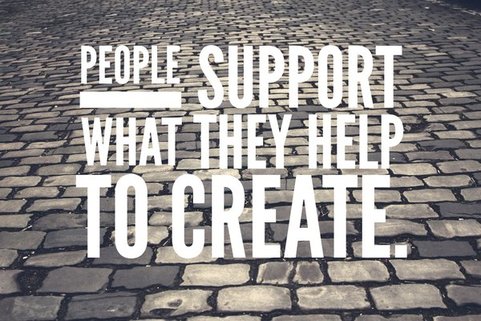|
Some of the greatest lessons you learn in life don't come from top business or personal growth gurus, but rather from unlikely places or at least in unlikely ways. I have been fortunate to study under some of the greatest mentors of our time ( Zig Ziglar, Brian Tracy, Tony Robbins, etc.) and have learned so much from them and credit their wisdom in helping me on my path in large ways. But some of the best life lessons come from sources outside the business world and below is one of the most important ones I have ever learned. Helen has an amazing story. She was born in Hungary during World War I and grew up through the wars. Eventually her family made it to the United States, like many immigrants trying to create a better life. With no money and just a drive to make something of themselves; they eventually did. They ended up owning businesses, a restaurant, and some other ventures. Nothing super successful, but enough to put food on the table and a roof over their head after long days of work. Helen went through her own hard times in raising her family. She found success walking 12 hours a day selling Avon and baking cookies for her kids to sell on the street, while her husband worked at an auto plant. They didn't have much and there are some pretty wild stories from the family as they grew up. But all of her kids made it out and were all extremely successful in different areas. She lived to be 100, she had a great life. Look Both Ways and Go Like Hell I met Helen when I was very young because she was my grandmother, Helen Lukas. She had so many pearls of wisdom that a kid overlooks as he grows up, only to look back years later and see how amazing and useful that wisdom truly is. I could write 20 blog posts on "Wisdom from Helen" and maybe I will some day, but there is one lesson that transcends across all areas of life that I didn't truly see until we lost her a few years back.
Even in her later days, Grandma always drove a golf cart around her neighborhood to get places (she liked to go to the dog park a lot) and when she got too old for that, she drove a motorized chair (her Jazzy). She would always say the same thing when she got to a street, doorway, or really any stop and start; "You look both ways, and then go like hell, honey!" Now, of course some of it was fun and we laughed every time she said it, even when she smashed her jazzy into a display at Walmart because she lost control, but there was real wisdom in her message as it was a metaphor for life. Look Both Ways and Go Like Hell is really a mantra for how to live life to the fullest. Sure, check to make sure there is nothing dangerous in your way, but then accelerate, and don't let up...go like hell. Whether its driving your business to new heights, a personal goal, or changes you know you need to make in your life, attack them with vigor, passion, and a sense of purpose. Do the actions you need to do to make them a reality. Grandma Helen's wisdom spurred the creation of this site. I sat on the idea for over a year before I saw a video of grandma laughing and saying "You always look both ways and go like hell, honey. That's how you do it." I decided then and there that I had looked both ways long enough and it was time to go like hell. Misfit came together in less than a month after that. It's your turn. Whatever it is that you know you need to get onto in your life, do it - Look both ways and go like hell! Thanks gram!
1 Comment
Let's face it. For those of us that have been in the game awhile; we have a healthy love/hate relationship with Entrepreneurship.
Don't get me wrong, I believe being an entrepreneur in today's world, is not only easier than ever, but it is the only way to go if you want true freedom and control over your own destiny. And that's the challenge of it. One minute things can be going awesome, the next minute they can fall apart. For example, win a big client one day, lose one the next. But for those of us that understand and are committed to the game, there is nothing better. Here are 5 things we love (and sometimes hate) about Entrepreneurship. 1.) The Hustle As an entrepreneur, no matter what stage you are in, you always have to hustle. Whether you are the young disruptor coming up, or you've been at it a while, but know those young disruptors are always lurking; you've got to hustle, make it happen, continue to grind, and push the boundaries. The beautiful part about this is that it is something you will always do and as an entrepreneur love to to do. There is opportunity around every corner, in every connection, and always ways to improve and grow. That is what makes it fun and exciting. The downside, if you call it that, is that it is something you always will have to do. You cannot rest. You cannot get complacent. You have to hustle day in and day out. And you have to keep that perspective in place, otherwise you can burn out. 2.) The Process of Becoming Bullet Proof If you've been an entrepreneur for some time, you probably know the exact date you went from questioning yourself and your ability to make it, to where you became "bullet proof" knowing you could overcome anything. We've all been there. You're accounting person is scared to death because "we're not gonna make payroll," or "we just lost a major deal that we were counting on," and even "my best employee just took another job." Entrepreneurs always have to be ready for anything and he able to handle anything. It really is a special skill, that no matter how much toughness you are born with, still has to be cultivated through experience over time. Entrepreneurs are at their best when they are figuring out how to overcome the toughest challenges and continue to move forward. Of course, this sometimes also really sucks and can make life not so fun for a while, but overcoming the challenge is what you have to do to become "bullet proof." And we love that. 3.) Long Days (and nights) No matter what you do, you're going to have some long days and nights. The thing we love about long days and nights in being an entrepreneur is that we typically want to put in that time and enjoy it immensely. We know that we are growing our business, that we are putting in the time the competition isn't, and that we are separating ourselves and our business in the marketplace. To us, it's a joy, but to our families, that isn't always the case. And this is where a lot of entrepreneurs make the mistake and lose balance. Even though you could work every night and every weekend doesn't mean you should. So, by all means, put the time in and love that you are doing the little things that are going to pay off down the road, but don't miss out on all the little things happening right now. Trust me, you'll regret it later. 4.) The Pursuit This goes along with the hustle. The reason you are hustling is that you are in pursuit of something. It could be a goal, a business milestone, the release of a new product, winning your biggest client; anything really. As entrepreneurs, we love the pursuit and reaching the next level of success, whatever it is. The one thing we don't like (usually afterward with some reflection) is how sometimes the pursuit can blind us. We get so focused, sometimes obsessed, and in the zone on what we are going after, that we miss other critical things going on and the opportunity to address them before they become larger issues (see point #2 above). Then, we have to work harder and waste more resources to deal with them later when they are larger. This can happen to anyone, in any role, but as an entrepreneur, time and resources are our most precious commodities and we hate to waste them. Always make sure to stop and check the rest of your business while on the pursuit. 5.) The Responsibility Whether entrepreneurs admit it or not, we love the responsibility. We love being able to create something from nothing. We love hiring our employees, helping them reach their goals, and watching them contribute in ways we know we never could. We love knowing that sometimes, its falls squarely on us to make it happen and keep "this thing running." And we love helping so many clients with our products and solutions. We don't take this responsibility lightly and there are definitely some bad days. But, we know that is part of the responsibility, part of the hustle, part of the long days and nights, part of becoming bullet proof, and part of the pursuit. And we wouldn't want it any other way... No leader is perfect. And I am definitely not yet fully the leader I aspire to be. But, I have been fortunate to work with some great leaders, learn from them, and figure out a few things that work along the way. This has helped me to have some success in leading people and exponentially grow organizations, including one on the INC 5000 list multiple years' running.
Leading people is an art, but it does not have to be complicated. Many times we make things too complex and read into situations more than we need to. And this creates more problems. There are the 4 concepts that are essential to building a high performing culture and to make sure you are practicing as a leader. I call them the Four Pillars of Leadership. If you follow these and more importantly, make them your own for your business or for those you lead; they will give you a great starting point for success. Pillar 1: People Support What They Help to Create This sounds easy. Make sure those that you are leading and making decision for in your business, have some input. But, its really not. Especially for entrepreneurs. How many times do we find ourselves telling people what to do and telling your team or employees how "we are going to do things" or "how its going to be." More importantly, if you have a team member that you are trying to spur to action or help overcome a situation, how apt are they to really take ownership and initiative, if you just tell them what they should do? The key is to make people part of the process. Get their input, or more importantly, allow their input. When someone comes to you with a problem, instead of telling them what to do, ask them how they think it should be solved...and then empower them to do it. People support, with unbridled enthusiasm, what they help to create and feel ownership in. And that brings us to the next pillar. Pillar 2: People Want and Love to Be a Part of Something Bigger Than Themselves Let'e face it, it's our nature to want to be part of the winning team or part of where the momentum is going. Think about how you have felt if you were part of a winning team or maybe when your favorite sports team is doing really well. You are more excited, more driven, more passionate. It's your job as a leader to create a culture where people feel they are part of a bigger mission, not just their own. And it's your job to make sure you are crystal clear on how they can have an impact and make a difference in making that mission a reality. There are two things that are essential to doing this. First, have a purpose for your business or team. Make sure everyone knows what the purpose is and as you create it, ask them for feedback (see Pillar #1). Everyone in your organization should be able to articulate the purpose. It should be short, meaningful, and inspiring. For example, we recently went through an exercise where we redefined our purpose in Grasp Technologies with our senior leadership team. The result was so simple: "Happy Employees, Happy Customers, Everyone Wins." And that is how we approach every day, with that in mind and now all of our teams have this in mind as they approach their day with each other, our clients, partners, etc. It is already making a difference. Second, once you have a purpose for your organization, then you need a mission. Think of purpose as the "what" and mission as the "how." We reworked our mission at Grasp as well and simplified it to this, "To hep customers succeed and thrive by transforming data into intelligence." Our teams now have something bigger to strive for in our purpose and our mission and it is already making a difference. Don't skip this step, make sure to create your purpose and your mission and allow those that are helping to shape make them a reality to have input. Pillar #3: Recognize People When Recognition is Due This another one that seems so simple, but doing it is the hard part. I am not talking about big annual recognition or service awards or things like that. Those are good and should be done. I mean the day to day, in the trenches, recognition. Leaders often are moving so fast that as soon as we get something completed or get a win, we quickly move on to the next initiative. As a leader, we must have the emotional intelligence and wherewithal to make sure we recognize and share our gratitude with our employees and teams. This can be as simple as a conversation or hand written note to say "thank you for the effort." You do not need to (or want to) go overboard with it, and be thanking people for every little thing or recognizing them for doing what they are supposed to be doing in the normal work. But when someone goes above and beyond or really steps up, make sure to let them know you appreciate it and see this effort. This is not only the right thing to do, but you will be amazed at how they will continue to practice this behavior and others will begin to do so as they see their peers upping their game. Pillar #4: People Live Up to the Expectations That Are Set For Them This is probably the hardest of the Four Pillars to balance. Setting expectations is easy, doing it correctly is not. It takes balance. Set an expectation for someone that is way too high to achieve and you will discourage them, but at the same time, you want to stretch them a little to grow. Set an expectation too low and you could end up creating a culture of low performance. People will live up to the expectations set for them, high or low. It's your job as a leader to make sure to find the balance and give clarity to your people. There is no secret formula for this as every person is different in their capabilities, attitudes, goals for themselves, etc. You will need to create expectations on an individual basis for those you directly impact. The important thing is to tie in the other Pillars. Give them an opportunity give feedback on what they think high performance looks like and what stretching themselves means to them (that way they will support what they help to create). Tie the expectation you set to, and show them how its fits into, the bigger purpose and mission (making them a part of something bigger), and lastly, when they reach those expectations and go above and beyond, give them the recognition they deserve. As mentioned at the beginning, truly leading effectively is an art and using the Four Pillars as your base gives you a great place to grow from. You can use them with any team or company, or even coaching your kid's little league team. The Pillars are tried and true and tested throughout time. Put them to work for you! Recently, I was listening to a radio show and the host brought up a topic that I thought was extremely important and interesting. The host asked, "Are focused on doing well or are you focused on doing good." They went on to explain the difference they saw between the two and it got me thinking, deeply. First, let's examine the question, "Are focused on doing well or doing good?" It is a peculiar question. Forget the grammatical difference between the two. If someone asked you either of those individually, you would think the meaning was the same. But it's not. Let me explain What's our primary focus in our lives? What does it mean to do well? What does it mean to do good? When I looked at those questions, it became clear to me. One is more selfish and the other is more giving. I can do "good" for others and I can do "well" for myself. I can't do "well" for others. Sadly, most people are focused on doing well for themselves and enriching their lives. The good is an afterthought. But, can we do both? Can we do well for ourselves and at the same time do good? I believe so, but we must focus on the good first and the well second. You see, if you are focused on the wrong things, you can do well, but you may never do good or feel good. Some of the people I have met that are doing really “well” are some of the most miserable people I have ever met, because they have essentially chained themselves to that mantra. To the big house, nice car, to the pursuit of making sure they project an aura that they are doing well. Their life is going "well" as defined by whatever social construct they subscribe to…sure they’ve got issues, and they can take care of them on the surface with money or medication, drinking, whatever- at least for a little while. But the next day or next week or month, those problems or issues are back again, they are still there. The world is telling them that they are doing really “well.” And that enslaves them. They stay in jobs they hate. They don't have the relationships they would like. They can't be the person that they really want to be, etc. I know this because I have been there. I have been in exactly this same trap. To break out and lead a life of doing well and good takes a lot...A LOT. The main thing it takes is serious change. Change in all areas of your life. It takes great courage to change. It takes forgiveness – most importantly of yourself, and it takes a commitment. And change is hard. But, as Les Brown said, "Change is difficult, but often essential to survival." Tweet This: It takes great courage to change. It takes forgiveness – most importantly of yourself, and it takes a commitment. So the question really becomes, “Can you do well and do good at the same time?" Yes, but for you, I don’t know, because it means you will have to change. You will have to reevaluate, dig out, and seek the answers. You will have to find true humility. And you have to want to do it. You will have to break habits, and will have to change in all areas of your life. Your friends will change, you may have to move to another job or business. Are you willing to do this?
In some ways, real, profound change to go to higher levels or to become the person you really want to be comes with “losing it all.” And I don’t mean this in terms of your material possessions or you money. I mean losing all of the conditioning, the habits, the ways of thinking that keep you where you are, and taking a hard look at what you truly and really believe. Then comes the hard part. The decision and commitment to truly change. This is where 99% fail. They get it. They understand it They want to do well and good, but they simply aren't strong enough to go through the change in themselves to make it a reality. Changing their habits, their conditioning, their beliefs, etc. They try, but ultimately it doesn't last and they end up back in the trap. But here's the thing. It can be done. It has been done many times before by people throughout time from all walks of life and all different backgrounds. You cannot expect to achieve new goals or move beyond your present circumstances unless you change. That is the struggle. You can’t take the easy way on balancing doing well and doing good because there is no shortcut to sustaining it in your life. It is work and then more work, but it is well worth it to live life to its fullest. I can tell you where to start in doing this, but the rest it up to you. Start will looking at your life and asking this question, "Is this truly who I am and who I want to be?" For most, if they are honest, the answer is no for some part or all of it. Then, you have to examine your life, your habits, how you think, and what you believe and decide what you are going to change, so that you can be that person. Next, the hard part. You have to work every day at it and commit to it. What this looks like is ultimately up to you, but my best advice is don't start down this path unless you will make it a commitment for the rest of your life. If you are strong enough to see it through for some time, you will notice that the person that you want to be or become will start to manifest in your life, and at that point, it gives you the momentum and taste that you need to keep going. Don't quit before that moment. I will finish with what the host of the show said to end his monologue because I feel the same way, "I am not the man I hope to be. I am not the man I need to be. But I am not the man I used to be." I continue to work on balancing doing well with doing good in my life and probably will to the end, but it has been so worth it! |
Click Below to Join Misfit Nation and Get Your Free Copy of "The Top 10 Lessons to Thrive and Succeed!"
Archives
July 2024
Categories
All
Follow Misfit on Twitter!
|
© MISFIT ENTREPRENEUR 2018. ALL RIGHTS RESERVED. Terms and Conditions. Privacy Policy. Affiliate Disclaimer





 RSS Feed
RSS Feed

